必修1.4 Earthquakes(教学案)-2017年高考英语一轮复习精品资料(解析版)
高考一轮复习学案必修1 Unit 4 Earthquakes
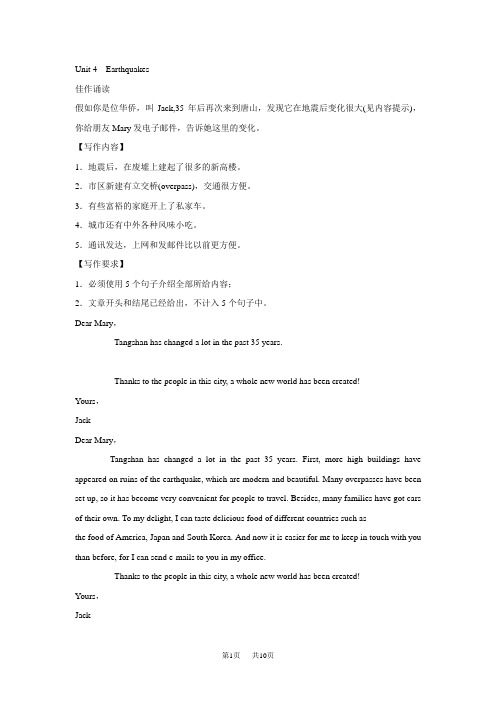
Unit 4Earthquakes佳作诵读假如你是位华侨,叫Jack,35年后再次来到唐山,发现它在地震后变化很大(见内容提示),你给朋友Mary发电子邮件,告诉她这里的变化。
【写作内容】1.地震后,在废墟上建起了很多的新高楼。
2.市区新建有立交桥(overpass),交通很方便。
3.有些富裕的家庭开上了私家车。
4.城市还有中外各种风味小吃。
5.通讯发达,上网和发邮件比以前更方便。
【写作要求】1.必须使用5个句子介绍全部所给内容;2.文章开头和结尾已经给出,不计入5个句子中。
Dear Mary,Tangshan has changed a lot in the past 35 years.___________________________________________Thanks to the people in this city, a whole new world has been created!Yours,JackDear Mary,Tangshan has changed a lot in the past 35 years. First, more high buildings have appeared on ruins of the earthquake, which are modern and beautiful. Many overpasses have been set up, so it has become very convenient for people to travel. Besides, many families have got cars of their own. To my delight, I can taste delicious food of different countries such asthe food of America, Japan and South Korea. And now it is easier for me to keep in touch with you than before, for I can send e-mails to you in my office.Thanks to the people in this city, a whole new world has been created!Yours,Jack清点单词1. vi. 爆裂;爆发n. 突然破裂;爆发2. n. 事件;大事3. n. 废墟;毁灭vt. 使破产;毁灭4. n. 苦难;痛苦5. vt. 损害,伤害6. vt.破坏;毁坏;消灭7. v. (使)震惊;震动n. 休克;打击________________ ____________________________________________________________________________ ___________________________________bursteventruinsufferingInjuredestroyshock8. n. & vt. 援救;营救9. vt. 使陷入困境n. 陷阱;困境10. n. 电;电流;电学11. n. 灾祸;灾难12. vt. 埋葬;掩埋;隐藏13. n. 避身处;掩蔽(处)14. n. 记者____________________ ____________________________________________________________ ____________________ ________________________________________rescuetrapelectricitydisasterburyshelterreporter15. vt. & n. 损失;损害16. vt. 使惊吓;吓唬17. n. 祝贺;(复数)贺词18. n. 裁判员,法官vt. 断定;判断19. vt. 表达;表示n. 快车;速递20. n. 要点;大纲;轮廓____________________ ____________________ ____________________ ____________________ ________________________________________damagefrightencongratulationjudgeexpressoutline扫描短语1. 立刻;马上2. 仿佛;好像3. 结束;终结4. 成为废墟,严重受损;破败不堪5. 掘出;发现6. 大量的7. 埋头于;专心于____________________ ____________________ __________________________________ ____________________ ____________________ ____________________right awayas ifat an endin ruinsdig outa (great) number ofbe buried in____________________ ____________________ ____________________ ____________________8. 倒下9. 代替10. 被困于11. 吹走fall downinstead ofbe trapped inblow away1.But the one million people of the city, ________ thought little of these events, were asleep as usual that night.2.It was felt in Beijing, ________ is more than two hundred kilometers away.whowhich3.The army organized teams to dig out those ________ were trapped and to bury the dead.4.Workers built shelters for survivors ________ homes had been destroyed.whowhose1. burst (burst, burst) vi. (使)爆裂,(使)破裂,(使)爆炸The crowd burst into cheers.人群中爆发出一片欢呼声。
高中英语人教版必修一Unit4《Earthquakes》教案

Unit 4 Earthquakes1.Knowledge:Learn and master the new words and expressions in this period.Words:Ability:1.Train the students’ listening ability.2.train the students’ listening ability.3.Train the students’ ability to use the Internet to search for some usefulinformation.4.Train the students’ ability to cooperate with others.Emotion:1.Know the damage that an earthquake2.Know the ways to reduce the losses of an earthquake.Teaching important pointsTrain the students’ speaking ability by describing, talking and discussion. Difficulties:Train the students’ listening ability.Step1 Warming-upT:Do you know what happened in the Indian Ocean at the end of last year? It shocked or we can say frightened the whole world.S: A terrible tsunami broke out there on 26th December. More than 200 000 people were killed.T: Yes. It is said that it is the biggest in the fore decades. A tsunami is an undersea earthquake. Then have you heard of any land earthquakes? Would you please list some? 学.科.S: We can often hear that earthquakes occur in Japan. In 1906, an earthquake struck San Francisco, USA. About 700 people died in the earthquake and the fires. And as many as 250 000 people lost homes.T: But do you know any famous earthquakes that happened in our county?S: The Tangshan Earthquake that happened in 1976.T: Can you tell me what mighty happen in an earthquake? You may look at the two pictures on Page 25.Step 2 ListeningT: Before we learn the passage about an earthquake, let’s first know why there are earthquakes in the world. So let’s do some listening on Page 62. listen to the tape for the first time and try to get a general idea of the passage.Listen to the tape and check the answers.( It is about the cause of earthquakes and how we can reduce losses from them.)T: Listen to the tape for the second time and judge whether the statements in Part 1 are true of false.T: Let’s check the answers. Listen again and try to correct the statements that are false.T: Listen again and try to complete the table in Part 2.A few minutes later, check the answers. 学,科,网Z,X,X,K]Step 3 Homework1.Preview the reading passage on Page 26 and do exercise I in the part “Learningabout language”.2.Ask the to look for more ways of reducing losses from earthquakes. The studentscan go to the library or use the Internet to search for information. After searching for the information, each group should make a poster, informing people how to reduce the losses of an earthquake. 学_科_网Z_X_X_K]Record after teaching :_____________________________________________________________________ _____________________________________________________________________ _____________________________________________________________________ _____________________________________________________________________ _____________________________________________________________________ _____________________________________________________________________ _____________________________________________________________________ _____________________________________________________________________ _____________________________________________________________________The Second PeriodKnowledge:Learn some new, phrases and some new sentence patterns.Ability:1.learn some detailed information about an earthquake.2.improve the students’ reading ability.3.train the students’ ability to grasp key information while listening.4.train the students’ speaking ability.Emotion:1.Train the students’ ability to cooperate with others.2.Know the deadliness of an earthquake and the signs before an earthquake iscoming.3.Learn from the bravery of people in Tangshan to face the reality and rebuild thecity.Teaching important points:1 The new words and expressions.2. Learn some detailed information about an earthquake.3. Train the students’ ability to cooperate with others.4. Train the students’ speaking ability.Teaching difficulties:1 Words: shake, burst, rise, destroy, shock, fresh, injure2. Phrases: right away, at an end3. Sentence patterns:(1) It seemed/ seems that…(2) The number of sb./sth. Reached/reaches…(3)All hope was not lost.4. Improve the students’ reading ability.5. Train the students’ ability to grasp key information while listeningTeaching procedures:Step 1 Pre-readingT: Suppose you are warned of a coming earthquake. Now you have time to take only one thing. Tell your partner what you will take and the reason.T: If an earthquake is around the corner, there must be some abnormal phenomena. Carefully look at the four pictures on Page 25 and try to describe what you have seen. Step2 ListeningT: Everyone knows that an earthquake is very terrible. Today, we will learn something about the strongest earthquake in China’s history, which happened in Tangshan, Hebei, in 1976. First listen to the tape with your textbooks closed and check whether the following statements are true or false. If it is false, try to correct it.1.People in Tangshan were warned of the earthquake and didn’t go to bed that night.(F)2.People in Beijing also felt the earthquake. (T)3.More than 400 000 people were killed in the quake. (F)4.Many rescue workers and doctors were trapped under the ruins during theaftershock. (T)5.People tried to get fresh water from under the ground in Tangshan. (F)Step 3 Reading1.Finish Part 1-2 in Comprehending on Page 27.2.Finish Part 3 in Comprehending on Page 27.3.Read the passage again to get important information about Tangshan Earthquakeand fill in the blanks. ( 百思英语Page 44 )Step 4 Speaking or Reading aloudIf your students are good at English, ask them to do this exercise:Suppose one of you was a newspaper reporter, and the other was a witness of the 1976 Tangshan Earthquake. Now the newspaper reporter is asking the witness some questions. Work in pairs please.If your students are very poor in English, ask them to do this exercise:Play the tape for the students to listen and follow in order to let them know how to read the text.Step 5 Homework1.Read the text several times.2.Do exercise 3 on Page 28.3.Do exercise 2 on Page 28 in the exercise book and hang it in tomorrow.4.Learn some words and phrases in this unit and make some sentences with them.( Ss’ Book, Page 82-84)Record after teaching :_____________________________________________________________________ __________________________________________________________________________________________________________________________________________ ____________________________________________________________________ _____________________________________________________________________ _____________________________________________________________________ _____________________________________________________________________ _____________________________________________________________________ _____________________________________________________________________ _ZxxkThe Third PeriodKnowledge:1.words: crack, burst, ruin, injure, destroy, shock, last2.phrases: at an end, right away, dig out3.sentence patterns:All hope was not lost.Ability:1.Train the students’ ability to read different numbers in English.2.Learn the usage of some difficult words and expressions.3.Train the students’ ability to remove the difficulties while reading.Emotion:1.Train the students’ ability to cooperate with others.2.Know the deadliness of an earthquake and the signs before an earthquake iscoming.3.Learn from the bravery of people in Tangshan to face the reality and rebuild thecity.Teaching important points:1.Train the students’ ability to read different numbers in English.2.Train the students’ ability to cooperate with others.Teaching difficulties:1.The explanation of some difficult words and expressions.2.Train the students’ ability to remove the difficulties while reading.Teaching procedures:Step 1 Revision1.T: In the last period , we learned something about the terrible Tangshan Earthquake in 1976, which is the deadliest earthquake in China’s history. Now I am going to ask you some questions based on the Reading passage.(1)What did people in Tangshan see in the sky before the earthquake? 学|科|(2)What did people notice in the wells?(3)Did people pay any attention to these abnormal phenomena?(4)When did the earthquake begin?(5)Were there any aftershocks?(6)Did the survivors deny the city and go to live in other places?2. Check the homework (Ex2 on P28). Ask them to recite it after class.Step 2 Learning about NumbersTurn to Page 28 and look at Part 3. Match each word to the number that has the same meaning. Allow the students several minutes to finish the task. Check the answers. Step 3 Important pointsAsk the students to turn to Page 82. Ask some students to make some sentences with the words or phrases. Deal with some difficulties. You can add more phrases.Step 4 homeworkIn order to master the usage of these words and expressions, please do some related exercises.1.Finish off the two parts in Using Words and Expressions on Page 63.2.Translate the sentences on Page 63 into English. Write the English sentences inone of your exercise book and hand it in tomorrow.Record after teaching :_____________________________________________________________________ _____________________________________________________________________ _____________________________________________________________________ _____________________________________________________________________ _____________________________________________________________________ _____________________________________________________________________ _____________________________________________________________________ _____________________________________________________________________ _____________________________________________________________________The Fourth PeriodKnowledge: ZXXK]1.Learn the Attributive Clause.2.Learn the difference between Relative Pronouns for the Attributive Clauses. Ability:1.Learn to choose the correct Relative Pronouns for the Attributive Clauses.2.Train the students’ ability to report what others have said.Emotion;Train the students’ ability to cooperate with each other.Teaching important points:1.Learn the Attributive Clause.2.Train the students’ ability to report what others have said.Teaching difficulties:Learn to choose the correct Relative Pronouns for the Attributive Clauses.Teaching procedures:Step 1 revisionCheck the homework exercises.Step 2 Grammar( The teacher writes the sentence “ Workers built shelters for survivors whose homeshad been destroyed.” On the blackboard before class begins.)T: Please look at the sentence on the blackboard, paying special attention to the underlined part. What kind of clause is it?Ss: The Attributive Clause.T: Yes. The Attributive Clause tells us which person or thing (or what kind of person or thing ) the speaker means.e.g. The woman who lives next door is a teacher.A sen tence with an attributive clause contains two shorter sentences. In the sentence above, the two short sentences are: “The woman is a teacher.”And “The woman lives next door.” The Attributive Clause is the answer to the question: Which woman is a teacher?Would you try to divide the sample sentence on the blackboard into two short sentences?T: That’s right. Now try to find all the sentences with Attributive Clauses in the reading passage and divide each sentence into two short sentences.T: Next I will say s omething about the common relative pronouns.“Who”is used for people. “Which”is used for things. “That” is used for things or people. “Whose” is used instead of his/her/their/somebody’s. “Whom” is quite formal, and in most cases it is all right to use who instead. But when whom has a preposition before it, it cannot be replaced by who.Ste p 3 Practice1. Now look at Part 2 in Discovering Useful Structures on Page 28. try to complete each sentence using that, which, who, or whose.Let the students do this exercise and check the answers.2.Do more exercises in Ex 3 on Page51 in《导学》Step 4 HomeworkAfter class, read the passage on Page 64. It’s about advice on how to protect your home from an earthquake. Complete the sentences below, using who, whom, which, that or whose.Record after teaching;_____________________________________________________________________ _____________________________________________________________________ _____________________________________________________________________ _____________________________________________________________________ _____________________________________________________________________ _____________________________________________________________________ _____________________________________________________________________ _____________________________________________________________________ _____________________________________________________________________ .The Fifth PeriodKnowledge:1.Know how to write a speech.2.Know how to write a newspaper story.Ability:1.Train the students’ speaking ability.2.Train the students’ ability to search for doing something.3.Train the students’ ability to do things step by step.Emotion:1.Honor the great people of Tangshan.2.Learn to cooperate to each other.Teaching Important Points:1.Train the students’ speaking ability.2.Train the students’ ability to search for doing something.Teaching Difficulties:1.Know how to write a speech.2.Know how to write a newspaper story.3.Learn to cooperate to each other.Teaching Procedures:Step 1 RevisionT: In the last period, we learned the Attributive Clause and how to choose a proper relative pronoun. Now let’s check your homework exercises. Please open your textbooks and turn to Page 64. Look at Part 1 in Using Structures. I will ask some of you to read the sentences out.(The teacher corrects mistakes if there are any.)Step 2 Readi ng and WritingT: Read the letter on Page 29.In the blank at the beginning of the letter, write the last number of the year it is now. Then in the blank near the end of the letter, use a number to say how many years ago the quake happened.(After several minutes, the teacher checks the answers with the class.)T: Suppose you are the student who was invited to give the speech. What should you include in your speech?(Students give their different answers.)T: Y es, while writing, don’t forget to contain the information. Now I will give you 15 minutes to write the speech. You can follow the points in part 3 on this page. (While the students are writing, the teacher gets around the classroom and helps the students to deal with any difficulties that they have.)(After 15 minutes)T: Are there any volunteers to read his or her speech?( If there is nobody, the teacher asks one to read, and give some assessments.)Step 3 SpeakingT: Imagine that after your speech, Zhangsha asks you to give a short talk about the new stamps about Tangshan to honor the city. First, ask and answer the following questions in pairs.(1)What do these stamps show?(2)Do you think these stamps are very important and why?(3)Will you collect these stamps? Why and why not?(After the students ask and answer these questions in pairs.) 学科T: Now try to fill in the lines in the little talk. You can use some of the answers to the questions.T: Next I will ask one of you to read the little talk.Step 4 WritingT: By now you have learned writing a speech and a little talk. Now you are going to write an article for a newspaper about a special event that happed in your hometown. First, let’s learn some skills of writing news paper stories. Before you write, you should write an outline. This is very useful. Today, we will learn how to write an outline. Please turn to Page 31. Read the instructions in bold and pay attention to some questions I prepared to you.Q1: Why is an outline important?Q2: What should an outline include?Q3: Why is a headline important?Q4: What are the steps to finish a newspaper story?Q5: What is the feature of a newspaper story?Suggested answers:1.Because an outline will prepare you to write a better story.2. A good outline should have a headline, a list of main ideas and a list of importantdetails.3. A headline can tell the readers what the topic is, so it can attract the readers’attention since the reader may not have bought the newspaper before they read the headline.4.First, organize the main ideas. Next, put some details into each paragraph.5. A newspaper stor y gives the most important news first and the least importantnews last.T: Now let’s read the example of a newspaper story. Try to find the headline, main idea and details of each paragraph. You may work in groups of three.(After several minutes, the teacher asks the students the following questions :)Q1: What is the headline of the newspaper story?Q2: What is the main idea?Q3: What is the detailed information?T: Now turn to Page 32 and check your main ideals and detailed information.Step 5 HomeworkT: So now you know how to write a passage step by step. Prepare the outline for a short newspaper story for China Daily. Use the example to help you to organize your outline. You can first have a discussi on with your partner and decide which event you will write about. Try to write down the title, main ideas and detailed information. Then put them into a short passage.ZXXK]Record after teaching:_____________________________________________________________________ _____________________________________________________________________ __________________________________________________________________________________________________________________________________________ _____________________________________________________________________ _____________________________________________________________________ _____________________________________________________________________ _____________________________________________________________________ _____________________________________________________________________The Sixth PeriodKnowledge:Learn a passage about the San Francisco EarthquakeAbility:1. Learn to compare two similar passages.2. Train the students’ listening ability.Emotion:1. Learn to cooperate with others.2. Learn from the bravery of the people of San Francisco to face the reality. Teaching Important Points:1.Train the students’ listening ability.2. Learn a passage about the San Francisco EarthquakeTeaching Difficulties:Learn to compare two similar passages.Teaching Procedures:Step 1 RevisionT: In the second period of this unit, you learnt some detailed information about the Tangshan Eearthquake. Can you use several sentences to summarize the passage? S: Let me have a try. The terrible earthquake struck the city of Tangshan while people were sleeping. More than 400 000 people were killed or injured in the quake. After the quake, people found nearly everything was destroyed. But people in Tangshan didn’t lose heart. They rebuilt the city with the help of soldiers.T: Quite good. ZxxkStep 2 Reading and ComparingT: In the first period, we also talked about the earthquakes that happe ned in San Francisco. Today, we will learn a passage titled “The Story of an Eyewitness”, which is about the San Francisco Earthquake in 1906. It was written by Jake London, who was a famous American writer.T: First read the passage carefully. While reading, please think about the following questions:(1)How did the author feel about the earthquake?(2)How did the author feel about the people of San Francisco?(Ss read the passage, then the teacher asks someone to give their answers and checks the answers)(Answers will vary.)T: Quite good. You can keep your own answers as long as you think they are reasonable and you can find proofs from the passage.Read the first paragraph in this passage .Then go back and read again the first paragraph of the passage on Page 26. Compare the ways both writers give you details about the earthquakes. Try to finish the 4 exercises on Page 66. You may discuss i n group of three.(Ss read the two passage and finish the exercises.)(Then the teacher checks the answers.)T: Next I will play the tape of this passage for you to listen. Please pay special attention to the intonation.(After listening.)T: Now I will give you several minutes to read the third paragraph with feelings. Step 3 ListeningT: Just now we learned a passage written by an eyewitness about the terrible San Francisco earthquake in 1906. Now we will listen to a story told by a man who was a survivor of the earthquake. Listen to the tape the first time, and try to tell whether the statements in part 1 are true or false.(Teacher plays the tape for the students to listen and finish the task.)(After listening, the teacher checks the answers with the class.)T: Now let’s listen to the tape again and try to answer the questions in Part 2.(After listening, the teacher checks the answers) ZXXK]T: While listening to the tape, you should not only pay attention to the contents, but also the pronunciation and intonation. The sentences in Part 3 show us the sequence. I will play the tape again, you should mark liaison and incomplete explosion in these sentences. Then practice reading them aloud.Step 4 HomeworkT: In this class we read and listened to two stories ,both of which are about the 1906 San Francisco earthquake. The stories are true and were written for the Museum of the City of San Francisco. The museum has many such personal accounts and photos at /1906/06.html. If you are interested in them, you can surf in the site I’ve given to you.Record after teaching:_____________________________________________________________________ _____________________________________________________________________ _____________________________________________________________________ _____________________________________________________________________ _____________________________________________________________________ _____________________________________________________________________ _____________________________________________________________________ _____________________________________________________________________ _____________________________________________________________________The Seventh PeriodKnowledge:1.Learn how to make an earthquake plan.2.Learn what to contain in a personal earthquake bag.Ability:1.Train the students’ listening abil ity.2.T rain the students’ speaking ability.3.Learn to find reasons for their choices.4.Learn to sum up what they have learned in the unit.Emotion:Learn to coop erate with others.Teaching Important Points:1. Train the students’ listening ability.2. Tra in the students’ speaking ability.Teaching Difficulties:Learn to find reasons for their choices.Teaching Procedures:Step 1 GreetingsGreet the whole class as usual.Step 2 ListeningT: These days Earthquakes are always our central topic. We have learned many things about it. Up till now, earthquakes are difficult to predict. We can hardly avoid an earthquake. But actually we can do things to reduce the losses of an earthquake. Let’s look at the form on Page 66 and have a discussion about the earthquake plan with your partner.( Ss give their answers)T: What should you do if you are outside?(Ss give their answers)T: What should you do if you are in the living room?(different answers)T: What should you do if you are in the house room?(different answers)T: Next we are going to listen to the tape and write down the three “things” that are mentioned.(After listening, teacher checks the answers with the students.)T: Then let’s listen again. This time you should write down more details about each of th e “things”.(After listening, teacher checks the answers with the class. Play the tape again if necessary.)Step 3 SpeakingT: You know every family should have an earthquake bag, in which there are enough things that you can use in case of an earthquake. Here we have a list of possible items for the personal earthquake bag. Choose only eight things, which you think are the most essential, from the list. They must last you five days. Discuss with your partner.(After several minutes.)T: Now join another pair and discuss your choices. Put all the things you agree on into a final list. Discuss the other items explaining your reasons and trying to agree which ones are the most suitable.(After several minutes.)T: Each group should choose one representative. Now be prepared to present your list to the class and give your reasons for each choice.Step 4 Learning TipT: In order to learn a language well, you should do a lot of practice, including listening, speaking, reading and writing. Only when we understand what is said to us can we have a conversation with somebody. So listening to English is very important. After class, you should listen to the English news on CCTV International. You will not only get a lot of information about what is happening around the world, but also improve your listening and learn more English words and expressions. At the same, you will improve your pronunciation and intonation.Step 5 Summing upT: Now let’s sum up what you have learnt in this unit. Work with your partner. First write down what you have learned about earthquakes. Then write down the verbs, nouns, expressions and new grammar items that you have learned from this unit. Step 6 Homework1.Review Unit 4. .2.Preview Unit 5.Record after teaching:_____________________________________________________________________ _____________________________________________________________________ _____________________________________________________________________ _____________________________________________________________________ _____________________________________________________________________ _____________________________________________________________________ _____________________________________________________________________ _____________________________________________________________________ _____________________________________________________________________The End。
人教版高中英语必修1教案Unit 4 Earthquakes
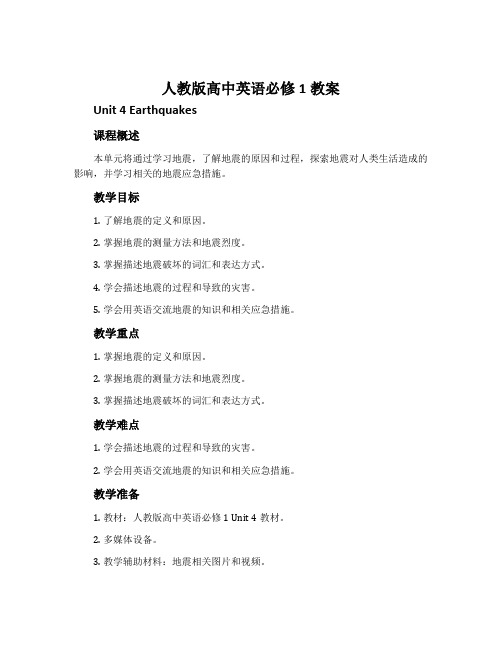
人教版高中英语必修1教案Unit 4 Earthquakes课程概述本单元将通过学习地震,了解地震的原因和过程,探索地震对人类生活造成的影响,并学习相关的地震应急措施。
教学目标1.了解地震的定义和原因。
2.掌握地震的测量方法和地震烈度。
3.掌握描述地震破坏的词汇和表达方式。
4.学会描述地震的过程和导致的灾害。
5.学会用英语交流地震的知识和相关应急措施。
教学重点1.掌握地震的定义和原因。
2.掌握地震的测量方法和地震烈度。
3.掌握描述地震破坏的词汇和表达方式。
教学难点1.学会描述地震的过程和导致的灾害。
2.学会用英语交流地震的知识和相关应急措施。
教学准备1.教材:人教版高中英语必修1 Unit 4教材。
2.多媒体设备。
3.教学辅助材料:地震相关图片和视频。
教学过程Step 1:导入引入地震话题,通过展示一些地震相关的图片和视频,激发学生对地震的兴趣。
Step 2:预习导入让学生回顾并回答上一课程的问题,复习地震的原因和地震烈度的概念。
Step 3:新课讲解1.引入新课程,并解释地震的定义和原因。
2.分析地震测量方法和地震烈度的概念。
3.教授描述地震破坏的词汇和表达方式。
Step 4:课堂练习1.教师提供一些描述地震破坏的情景,让学生用英语描述。
2.分组讨论地震破坏的方式和后果,并用英语呈现自己的讨论结果。
Step 5:拓展阅读教师提供一篇有关地震的拓展阅读材料,让学生阅读并回答相关问题,扩展学生对地震的了解和地震相关词汇的应用。
Step 6:小组活动学生分组进行小组讨论和设计,就地震应急措施展开讨论,并用英语准备一份小组演讲。
Step 7:总结与评价教师进行本节课的知识总结,并对学生的表现进行评价和鼓励。
课后作业1.整理地震相关知识,写一篇300字的地震科普文章。
2.阅读教材中的相关练习,完成练习题。
总结通过本课程的学习,学生将掌握地震的基本知识和相关词汇,能够描述地震的过程和导致的灾害,并能用英语交流地震的知识和应急措施。
高中英语必修一人教版:Unit+4+Earthquakes+教学案1.doc

必修ⅠUnit4 Earthquakes知识点教学案三班级姓名小组号【学习目标】1.学生利用早读以及课下时间自学单词,能够熟练读出背出本单元考纲词汇及短语。
2.学生背诵并且能够默写出课标词汇及其相关拓展。
【重点难点】1.重点:熟练记忆课本词汇及相关短语。
2.难点:能运用所学单词和短语写出正确的句子。
【考点分析】能够运用所学重点单词、短语写出完整正确的句子【学情分析】学生通过自主学习和小组讨论能够总结出词汇的相关用法,在做题过程中发现并解决一些易出错的语法细节。
【导学流程】一、回顾旧知回顾上节课所学到重难点词汇、短语及其重难点句二、提问展示问题预设:1、提问课文中出现的单词、短语和重难点句2、小组讨论过程中解决知识点对应练习题并加以讲解,看时间多少来决定是否需要上板展示三、基础知识感悟:学生利用早读时间预习信纸复习旧知,理解每一单元需要掌握的知识,并且能从平时作业和限时训练题中找到适合自己的解题思路,对学到的知识加以消化理解掌握和运用四、自主学习thousands of成千上万的①billions of 几十亿;millions of 几百万;hundreds of 几百;dozens(一打,十二个) of =scores of;___________ 两百万tens of thousands of _________ hundreds of thousands of_______ ②______________ 2/5五、小组讨论1.judge n.法官,审判员;鉴赏家vt.审理;鉴定;判断;认为vt判断;评价Your speech was heard by a group of five judges,all of whom agreed that it was the best one this year.Judging by/from从...上看;根据...判断,置于句首作状语,v-ing形式不受主语的限制,构成独立成分。
高中英语人教版必修一Unit4Earthquakes单元教案
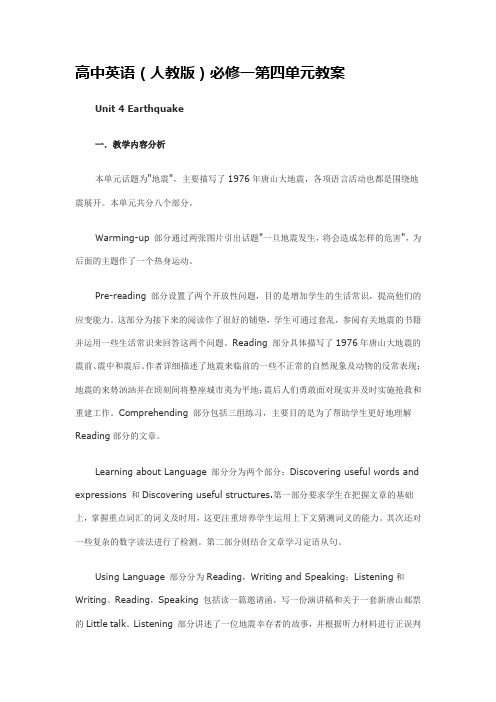
高中英语(人教版)必修一第四单元教案Unit 4 Earthquake一.教学内容分析本单元话题为"地震",主要描写了1976年唐山大地震,各项语言活动也都是围绕地震展开。
本单元共分八个部分。
Warming-up 部分通过两张图片引出话题"一旦地震发生,将会造成怎样的危害",为后面的主题作了一个热身运动。
Pre-reading 部分设置了两个开放性问题,目的是增加学生的生活常识,提高他们的应变能力。
这部分为接下来的阅读作了很好的铺垫,学生可通过套乱,参阅有关地震的书籍并运用一些生活常识来回答这两个问题。
Reading 部分具体描写了1976年唐山大地震的震前、震中和震后。
作者详细描述了地震来临前的一些不正常的自然现象及动物的反常表现;地震的来势汹汹并在顷刻间将整座城市夷为平地;震后人们勇敢面对现实并及时实施抢救和重建工作。
Comprehending 部分包括三组练习,主要目的是为了帮助学生更好地理解Reading部分的文章。
Learning about Language 部分分为两个部分:Discovering useful words and expressions 和Discovering useful structures.第一部分要求学生在把握文章的基础上,掌握重点词汇的词义及时用,这更注重培养学生运用上下文猜测词义的能力。
其次还对一些复杂的数字读法进行了检测。
第二部分则结合文章学习定语从句。
Using Language 部分分为Reading,Writing and Speaking;Listening和Writing。
Reading,Speaking 包括读一篇邀请函,写一份演讲稿和关于一套新唐山邮票的Little talk。
Listening 部分讲述了一位地震幸存者的故事,并根据听力材料进行正误判断和回答问题,旨在培养学生获取细节的能力,并通过听来模仿标准的语音和语调。
高中英语 Unit 4(Earthquakes)教案17 新人教版必修1 教案

高一英语新课标Unit 4 Earthquakes教案教学目标:Important vocabulariesShake, while, sound, scientist, point, movement, fall off, for a while, for ever, a (large ) n umber of, cut off, stay up,plate, hit, bookstore.Daily expressions:Were you in ……?Sure I was. I 'll never forget that.Very strange. It sounded like……What happened next?What was it like?Useful phrases:The population in and around San Francisco is now ten times more then it was in 1906.The number of people who lost homes reached as many as 250000.Grammar:The usage of pronouns in the Attributive sentences.Who/ whom/ which/ that……教学建议能力训练:运用所学的语言,围绕地震这个题材,开展听说写的活动;阅读课文“Earthquake",了解有关地震的基本知识,完成有关课文内容的练习。
并进一步练习间接引语的用法。
师生互动活动:Lesson 25: 口头练习,对话交际功能-----日常生活用语的练习。
Lesson 26---27: 听力和阅读相结合,理解全文的意思。
Lesson 28: 口头和笔头练习相结合,写一篇关于地震的文章。
教材分析本单元对话引出地震这个话题。
对话中提到了地震的时候的现象和人的感受。
人教版高中英语必修一U4 Earthquakes阅读课教学设计(英文详案)
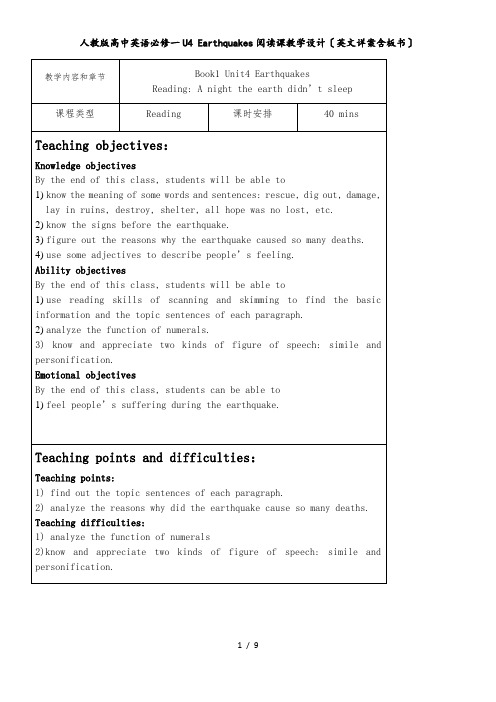
Teaching difficulties:
1) analyze the function of numerals
2)know and appreciate two kinds of figure of speech: simile and personification.
Teaching Procedures
Pre-reading
Activity 1 Brain storming(3mins)
Ss figure out some natural disasters according to their common sense and the pictures.
T:Good morning, class! Do you know any natural disasters? Can you figure out some words about natural disasters?
T: Do you agree with her/him? Does anyone have different opinion?
S5: In 15 terrible seconds, a large city lay in ruins.
1.4 Earthquakes(教学案)-2017年高考英语一轮复习精品资料(解析版) 含解析
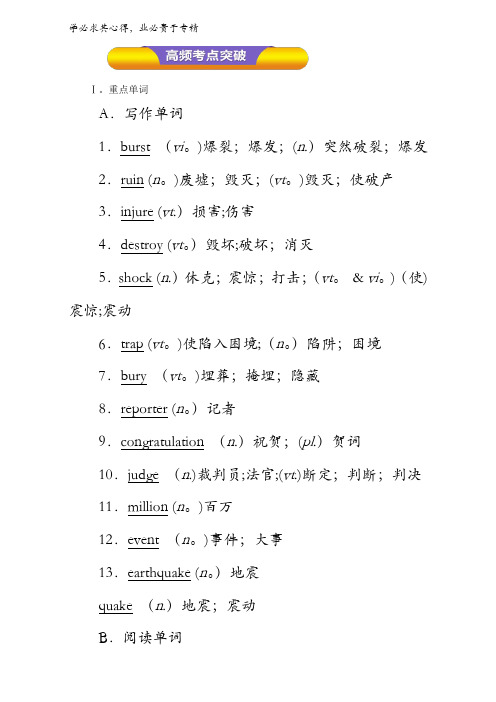
Ⅰ。
重点单词A.写作单词1.burst (vi。
)爆裂;爆发;(n.)突然破裂;爆发2.ruin (n。
)废墟;毁灭;(vt。
)毁灭;使破产3.injure (vt.)损害;伤害4.destroy (vt。
)毁坏;破坏;消灭5.shock (n.)休克;震惊;打击;(vt。
& vi。
)(使)震惊;震动6.trap (vt。
)使陷入困境;(n。
)陷阱;困境7.bury (vt。
)埋葬;掩埋;隐藏8.reporter (n。
)记者9.congratulation (n.)祝贺;(pl.)贺词10.judge (n.)裁判员;法官;(vt.)断定;判断;判决11.million (n。
)百万12.event (n。
)事件;大事13.earthquake (n。
)地震quake (n.)地震;震动B.阅读单词14.suffering (n.)苦难;痛苦15.extreme (adj.)极度的16.rescue (vt.&n.)救援;营救17.disaster (n.)灾难;灾祸18.shelter (n。
)遮蔽处;避身处;掩蔽19.bar (n。
)条;棒;条状物20.damage (n。
& vt。
)损失;损害21.sincerely (adv。
)真诚地;真挚地22.express (vt.)表达;表示;(n.)快车;速递23.outline (n。
)要点;大纲;轮廓24.well (n。
)井25.pipe (n.)管;导管26.nation (n.)民族;国家;国民27.canal (n.)运河;水道28.steam (n.)蒸汽;水汽29.brick (n.)砖;砖块30.dam (n。
)水坝31.track (n。
)轨道;足迹;痕迹32.electricity (n.)电;电流;电学33.title (n。
)标题;头衔;资格34.headline (n。
)报刊的大字标题35.useless (adj。
人教版高中英语必修1《Unit 4 Earthquakes》教案
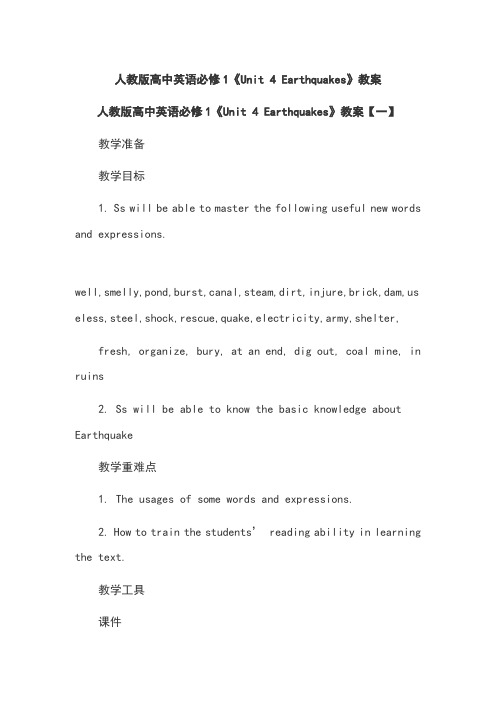
人教版高中英语必修1《Unit 4 Earthquakes》教案人教版高中英语必修1《Unit 4 Earthquakes》教案【一】教学准备教学目标1. Ss will be able to master the following useful new words and expressions.well,smelly,pond,burst,canal,steam,dirt,injure,brick,dam,us eless,steel,shock,rescue,quake,electricity,army,shelter, fresh, organize, bury, at an end, dig out, coal mine, in ruins2. Ss will be able to know the basic knowledge about Earthquake教学重难点1. The usages of some words and expressions.2. How to train the students’ reading ability in learning the text.教学工具课件教学过程Step I lead-inLet students see a short video and answer the questions1.What happened in the video? Earthquakes2.How do you feel seeing the plots(情节)? Students’discussion.Step II Fast reading1. What is the passage mainly about? InTangshan ,earthquakes happened on July 28th 19762. Skim the text and answer the questionsThe type of writing (写作体裁)Narrative writingTopic sentence of Paragraph 1Sentence 1Topic sentence of Paragraph 2Sentence 2Topic sentence of Paragraph 3Sentence 1Topic sentence of Paragraph 4Sentence 1Step III Detailed readingAsk students to read the text carefully and answer the questionsTask1: What were the nature signs of the coming earthquake?(选择)Para 11.Water in well( G )2. Well walls(D )3.Chickens &pigs(F )4 .Mice (A) 5.Fish(E ) 6. Bright lights( B) 7. Water pipes(C )A. Ran out of fieldsB. in the skyC. Cracked and burstD. Deep cracksE. Jumped out of pondsF. Too nervous to eatG. Rose and fell, fell and roseTask 2 Fill in the blanksMain IdeaDetailsDamage caused byearthquakePara 2-3At _____ am, the __________ earthquake of the 20th century began ._______ burst from holes in the ground.Hard hills of the rock became rivers of ____.________ covered the ground like red autumn leaves.Two _______ and most of the bridges fell.The railway tracks were now _________pieces of _______.______ now filled the wells instead of water.Water,food,and ______________ were hard to get.The reconstruction(重建) after the earthquakePara 41. The army _____________2. Workers ____________for survivors.3._____________was taken to the city.Details:1. At 3:42 am, the greatest earthquake of the 20th century began.2. Steam burst from holes in the ground.3. Hard hills of the rock became rivers of dirt.4. Bricks covered the ground like red autumn leaves.5. Two dams and most of the bridges fell.6. The railway tracks were now useless pieces of steel.7. Sand now filled the wells instead of water.8. Water, food, and electricity were hard to get.Step IV consolidation (当堂巩固)Let students fill the blanks according to the passageStrange things were happening in the countryside of northeast Hebei. For three days the water in the village wells kept rising and 1_________(fall). Farmers noticed that the well walls had deep cracks 2___________ them. A smelly gas came out of the cracks. In 3_________farmyards, the chickens and even the pigs were too nervous 4__________(eat). 5_________(mouse) ran out of the fields looking for places 6________(hide). Fish jumped outOf their bowls and ponds. At about 3 am on July 28,1976, some people saw bright lights 7_________ the sky. The sound of planes could 8________(hear) outside the city of Tangshan even 9_________ no planes were in the sky.In the city, the water pipes in some buildings cracked and burst. But the one million people of the city, ________thought little of these events, were asleep as usual that night.1 falling2 in3 the4 to eat5 mice6 to hide 7in 8 be heard 9when 10 who这部分目的是让学生进一步巩固课文的内容。
高中英语 必修1 (Unit4 Earthquakes the 7th period) 精品教案

高中英语必修1(Unit4Earthquakesthe7thperiod)精品教案TheSeventhPeriod●从容说课Thisisthelastpe riodofthisunit,sotheteacherwilllayemphasisonrevisionandsummary.TheLearningTipofthisunitistolistentoEnglishmore.Soatfirst,thestudentswilldoalisteningtest.ItisastoryaboutasurvivoroftheterribleSanFranciscoearthquake.Afterlistening,thestudentsareaskedtodosometrue-or-falseexercisesandanswersomequestions.Thestepistoimprovethestudents’abilit ytocatchtheusefulinformationwhilelistening.Thenthestudentsareaskedtoreadafterthetapetoimitatethepro nunciationa ndintonation,whichisalsoapurposeoflistening.Thenthestudentswillsumupwhattheyhavelearnedinthisunit,includingtheknowledgeabouttheearthquakes,usefulwords,phrasesexpressionsandnewgrammaritems.Thestudentsshouldfrequentlylookbackonwhatthey havelearned.Onlyinthi swaycantheylearnthelanguagebetter.Atlastthestudentswilldoaproject.Thisrequiresthestudentstoputwhattheyhavelearnedinthisunitintouse.Thestude ntswillfirstdiscusstheprojectingroupsoffour.Thentheywillformdifferentgroupsandtellthenewgroupmemberstheirpla n.Thisstepistotrainthestudents’speakingabilityaswellastheabilitytocooperatewithothers.Italsorequiresthestudentstor easonwhattheyareplanningtodo.●三维目标1.Knowledge:(1)Theimportantwords,phrasesandexpressionsinthisunit.(2)Thenewgrammaritem,theAttributiveClause.2.Ability:(1)Trainthestudents’listeningability.(2)Trainthestudents’speakingability.(3)Trainthestudents’abilitytoreadwithfeelings.(4)Learntobelogicalwhiledoingthings.4.Emotion:(1)Learntocooperatewitheachother.(2)Learntobebravetofacethedifficulties.●教学重点(1)Trainthestudents’listeningability.(2)Trainthestudents’speakingability.●教学难点(1)Carryoutaproject.(2)Learntobelogicalwhiledoingthings.●教具准备(1)ataperecorder(2)aprojector(3)theblackboard●教学过程Step1GreetingsGreetthewholeclassasusual.Step2ListeningT:InthelastperiodwelearnedapassagewrittenbyaneyewitnessabouttheterribleSanFranciscoearthquakein1906.Todaywe willlistentoastorytoldbyamanwhowasasurvivoroftheearthquake.Listentothetapethefirsttime,andtrytotellwhetherthestatementsinPart1aretrueorfalse.(Teacherplaysthetapeforthestudentstolistenandfinishthetask.)(Afterlistening,theteachercheckstheanswerswiththeclass.)T:Nowlet’slistentothetapeagain.Thistimeyoushouldtrytocorrectthestatementsthatarefalse.(Teachercheckstheanswerswiththestudentsafterlistening.)T:Let’slistentothetapethethirdtimeandtrytoanswerthequestionsinPart2.(Afterlistening,theteachercheckstheanswers.)T:Whilelisteningtothetape,youshouldnotonlypayattentiontothecontents,butalsothepronunciationandintonation.Next,Iwillplaythetapeagain.YoushouldmarkliaisonandincompleteexplosioninthesentencesinPart3.Thenpracticereadingth emaloud.(Studentslistenandread.Meanwhile,theteachergoesaroundtheclassroomtocorrectanymistakesthatthestudentsmaymake.)Step3LearningtipT:Inordertolearnalanguagewell,youshoulddoalotofpractice,includinglistening,speaking,readingandwriting.Onlywhenweunderstandwhatissaidtouscanwehaveaconversationwithsomebody.SolisteningtoEn glishisveryimportant.Afterclas s,youshouldlistentotheEnglishnewsontheradioorwatchthenewsonCCTVInternational.Youwillnotonlygetalotofinform ationaboutwhatishappeningaroundtheworld,butalsoimproveyourlisteningandlearnmoreEnglishwordsandexpressions.Atthesametime,youwillimproveyourpronunciationandintonation.Step4SummingupT:Nowlet’ssumupwhatyouhavelearntinthisunit.Workwithyourpartner.Firstwritedownwhatyouhavelearnedaboutearthq uakes.Thenwritedowntheverbs,nouns,expressionsandnewgrammaritemsthatyouhavelearnedfromthisunit.(Afterseveralminutestheteacherwillasksomeindividualstudentstoreadoutwhattheyhavewrittendown.)Step5ProjectT:BynowyouknowthatearthquakesareterriblenaturaldisastersandthatChinaisunluckyenoughtohavealotofthem.Howev er,astheexampleofTangshanhasshown,peoplecanfindhopeforabrighterfutureevenafterabadearthquake.Workingroupsoffour.Firstsharewhatyouhavelearned aboutearthquakeswithyourgroupmembers.(Ssworkingroups.)T:Nowimaginethatyourgrouplivesinacitythathasbeenhitbyanearthquake.Yourgroupisgiventhejobtobuildanewcity.Ma kealistofthingsthatneedtobedone.Decidewhatthingsmustbedone firstandwhatthingscanbedonelater.Thelistofthingso nPage68shouldbeconsidered.Maybeyouwillhavedifferentopinionswithothergroupmembers.Remembertogivereason sforwhatyouhavechosen.(Ssdiscussingroups,whiletheteachergetsaroundtheclassroomandhelpsthestudentsdealwithanydifficultiestheymayhave.)T:Fromyourgroup’slist,chooseonethingthatyouconsidertobethemostimportantandwritedownyourreasons.(Afterseveralminutes.)T:Nowwewillmakedifferentgroups.Numbereverymemberofyourgroupfrom1to4.AllthestudentswithNo.1gotoonegrou p,andallthestudentswithNo.2gotothesamegroupandthesamewithstudentswithNo.3andNo.4.(Afterthestudentshaveformednewgroups.)T:Tellyournewgroupmembersthethingthatyouhavechosenandthereasons.Theneachgroupshouldmakealistofthreemosti mportantthings.(Afterseveralminutestheteacherchecksthestudents’answers.)(Theanswerscanbevarious.Buteachgroupmustprovideenoughreasonsforthethingsthattheyhavechosen.)●板书设计Unit4EarthquakeTheSeventhPeriodSummingupWritedownwhatyouhavelearnedaboutearthquakes.Fromthisunityouhavealsolearned·usefulverbs:·usefulnouns:·otherexpressions:·newgrammaritem:●活动与探究Poster-makingReportonEarthquakes:Uptillnowthestudentshavelearnedalotofthingsaboutearthquakes,includingtwoterribleearthquakesbothathomeandabroad,thecausesofearthquakes,thewaystoreducethelossesofearthquakes,andhowtoproduceanearthquakeplan.Sothestudentsare askedtomakeareporttothewholeclassabouttheseearthquake-rel atedthings.1.Workingroupsoffiveorsix.Listthethingstheywanttomention.2.Eachstudentofthegroupwritesoneaspectofearthquakes.binewhattheyhavewrittenintoapassage,addingnecessarywordsorphrases.4.Eachgroupchoosesonerepresentativetopresentthereporttothewholeclass.5.Choosethebestreporterandthebestgroup.●备课资料ACircusDisasterJuly6,1944,wasadayofnightmare(噩梦)thatIwillneverforget.ThatafternoonwhenIwasmakingupmyfaceinadressingtentatthemoment,Isuddenlyheardsomeonerunpastshouting“Fir e!”Firewaswhatwecircus(马戏团)peoplemostfearedfortherewasalargeaudienceinthetent,includingmanychildren.Irushedtowards thetentwithabucketbutIcould donothingwithitsincethetentwasburningtoohig handtheflamesspreadingquickly.Intheburningtentwasasceneofpanic(恐慌):peoplerushedtowardstheexits,andsomeevenjumpedtwelvefeetfromthetoprowsofthegrandstandtothegroundoutside.Somepeople,aftergettingout,triedtore-entertohelptheirrelativesorfriends.Yetitwasimpossibleforthemtogetthroughthecrowd;instead,theyblockedtheway,Ifoughtato neexit,shoutingatthetopofmylungs.“Goon!Keepmoving!”Ateveryexit,circuspeopleweredoingthesamething.Inthemidstofthisscene,themusicianskeptonplayinguntilthetentwasafireoverhead.Cityfireequipmentfinallyarrivedandputoutthefire.Allthecircuspeopleweresafethoughsomewerebruised(撞伤)orburnedduringtherescuework.Theaudience,however,werenotthatlucky.Inapanic,theyalltriedtousetheregularexitsthroughwhichtheyhadenteredtherent.Asaresult,168peoplehaddiedinthefire─theworstcircusdisasterinhistory.。
高考英语(人教版)复习教学案:必修1 Unit 4 Earthquakes
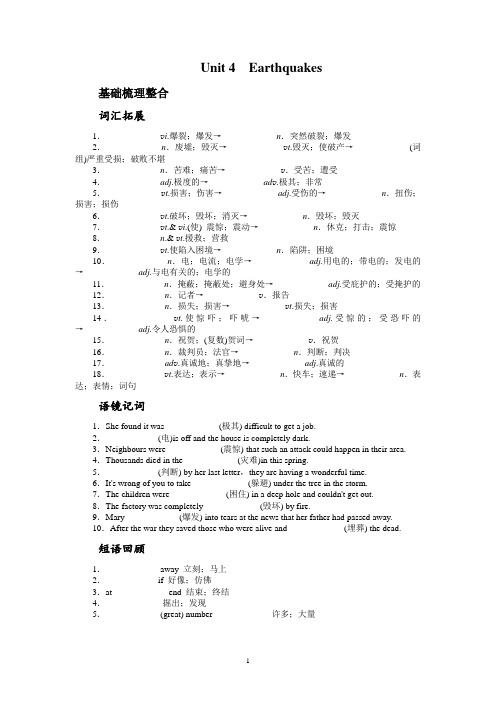
Unit 4Earthquakes基础梳理整合词汇拓展1.____________ v i.爆裂;爆发→____________ n.突然破裂;爆发2.____________ n.废墟;毁灭→____________ v t.毁灭;使破产→____________ (词组)严重受损;破败不堪3.____________ n.苦难;痛苦→____________ v.受苦;遭受4.____________ adj.极度的→____________ ad v.极其;非常5.____________ v t.损害;伤害→____________ adj.受伤的→____________ n.扭伤;损害;损伤6.____________ v t.破坏;毁坏;消灭→____________ n.毁坏;毁灭7.____________ v t.& v i.(使) 震惊;震动→____________ n.休克;打击;震惊8.____________ n.& v t.援救;营救9.____________ v t.使陷入困境→____________ n.陷阱;困境10.____________ n.电;电流;电学→____________ adj.用电的;带电的;发电的→____________ adj.与电有关的;电学的11.____________ n.掩蔽;掩蔽处;避身处→____________ adj.受庇护的;受掩护的12.____________ n.记者→____________ v.报告13.____________ n.损失;损害→____________ v t.损失;损害14.____________ v t.使惊吓;吓唬→____________ adj.受惊的;受恐吓的→____________ adj.令人恐惧的15.____________ n.祝贺;(复数)贺词→____________ v.祝贺16.____________ n.裁判员;法官→____________ n.判断;判决17.____________ ad v.真诚地;真挚地→____________ adj.真诚的18.____________ v t.表达;表示→____________ n.快车;速递→____________ n.表达;表情;词句语镜记词1.She found it was ____________(极其) difficult to get a job.2.____________(电)is off and the house is completely dark.3.Neighbours were ____________(震惊) that such an attack could happen in their area.4.Thousands died in the ____________(灾难)in this spring.5.____________(判断) by her last letter,they are having a wonderful time.6.It's wrong of you to take ____________ (躲避) under the tree in the storm.7.The children were ____________ (困住) in a deep hole and couldn't get out.8.The factory was completely ____________ (毁坏) by fire.9.Mary____________ (爆发) into tears at the news that her father had passed away.10.After the war they saved those who were alive and ____________ (埋葬) the dead.短语回顾1.____________ away 立刻;马上2.____________if 好像;仿佛3.at ____________ end 结束;终结4.____________ 掘出;发现5.____________ (great) number ____________ 许多;大量典句背诵1.It seemed ____________ ____________ the world was ____________ ____________ ____________!世界似乎到了末日!句型提炼:It seemed as if...句式。
高中英语必修一Unit4《Earthquakes》教学设计全面版
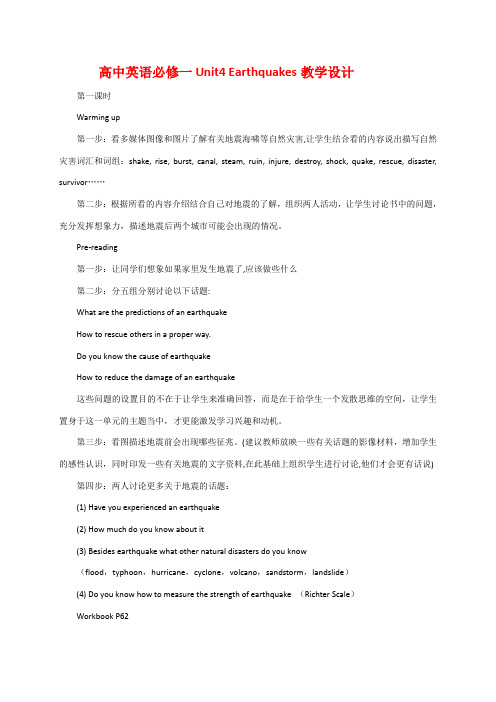
高中英语必修一Unit4 Earthquakes教学设计第一课时Warming up第一步:看多媒体图像和图片了解有关地震海啸等自然灾害,让学生结合看的内容说出描写自然灾害词汇和词组:shake, rise, burst, canal, steam, ruin, injure, destroy, shock, quake, rescue, disaster, survivor……第二步:根据所看的内容介绍结合自己对地震的了解,组织两人活动,让学生讨论书中的问题,充分发挥想象力,描述地震后两个城市可能会出现的情况。
Pre-reading第一步:让同学们想象如果家里发生地震了,应该做些什么第二步:分五组分别讨论以下话题:What are the predictions of an earthquakeHow to rescue others in a proper way.Do you know the cause of earthquakeHow to reduce the damage of an earthquake这些问题的设置目的不在于让学生来准确回答,而是在于给学生一个发散思维的空间,让学生置身于这一单元的主题当中,才更能激发学习兴趣和动机。
第三步:看图描述地震前会出现哪些征兆。
(建议教师放映一些有关话题的影像材料,增加学生的感性认识,同时印发一些有关地震的文字资料,在此基础上组织学生进行讨论,他们才会更有话说)第四步:两人讨论更多关于地震的话题:(1) Have you experienced an earthquake(2) How much do you know about it(3) Besides earthquake what other natural disasters do you know(flood,typhoon,hurricane,cyclone,volcano,sandstorm,landslide)(4) Do you know how to measure the strength of earthquake (Richter Scale)Workbook P62(这部分听力材料的内容刚好是针对以上话题的,关于地震产生的原因和影响)第一步:先让学生猜测练习一中的陈述哪些是正确的,哪些是错误的。
- 1、下载文档前请自行甄别文档内容的完整性,平台不提供额外的编辑、内容补充、找答案等附加服务。
- 2、"仅部分预览"的文档,不可在线预览部分如存在完整性等问题,可反馈申请退款(可完整预览的文档不适用该条件!)。
- 3、如文档侵犯您的权益,请联系客服反馈,我们会尽快为您处理(人工客服工作时间:9:00-18:30)。
Ⅰ.重点单词A.写作单词1.burst (vi.)爆裂;爆发;(n.)突然破裂;爆发2.ruin (n.)废墟;毁灭;(vt.)毁灭;使破产3.injure (vt.)损害;伤害4.destroy (vt.)毁坏;破坏;消灭5.shock (n.)休克;震惊;打击;(vt. & vi.)(使)震惊;震动6.trap (vt.)使陷入困境;(n.)陷阱;困境7.bury (vt.)埋葬;掩埋;隐藏8.reporter (n.)记者9.congratulation (n.)祝贺;(pl.)贺词10.judge (n.)裁判员;法官;(vt.)断定;判断;判决11.million (n.)百万12.event (n.)事件;大事13.earthquake (n.)地震quake (n.)地震;震动B.阅读单词14.suffering (n.)苦难;痛苦15.extreme (adj.)极度的16.rescue (vt.& n.)救援;营救17.disaster (n.)灾难;灾祸18.shelter (n.)遮蔽处;避身处;掩蔽19.bar (n.)条;棒;条状物20.damage (n.& vt.)损失;损害21.sincerely (adv.)真诚地;真挚地22.express (vt.)表达;表示;(n.)快车;速递23.outline (n.)要点;大纲;轮廓24.well (n.)井25.pipe (n.)管;导管26.nation (n.)民族;国家;国民27.canal (n.)运河;水道28.steam (n.)蒸汽;水汽29.brick (n.)砖;砖块30.dam (n.)水坝31.track (n.)轨道;足迹;痕迹32.electricity (n.)电;电流;电学33.title (n.)标题;头衔;资格34.headline (n.)报刊的大字标题35.useless (adj.)无用的;无效的;无益的useful (adj.)有用的36.frighten (vt.)使惊吓;吓唬frightened (adj.)受惊的;受恐吓的frightening (adj.)令人恐惧的Ⅱ.重点短语1.right away立刻;马上2.think little of不重视3.as if好像;仿佛4.at an end结束,终结5.in ruins严重受损;破败不堪6.a (great) number of许多;大量的7.dig out掘出;发现8.be proud of/take pride in因……而自豪Ⅲ.经典句式1.In the farmyards,the chickens and even the pigs were too nervous to eat.在农家大院里,鸡甚至猪都紧张得不吃食了。
2.It seemed as if the world was at an end!仿佛到了世界末日!3.Thousands of families were killed and many children were left without parents.成千上万个家庭遇难,许多孩子变成了孤儿。
4.All hope was not lost.不是所有的希望都破灭了。
5.The army organized teams to dig out those who were trapped and to bury the dead.部队人员组成小分队,将受困的人们挖出来,将死者掩埋。
Ⅳ.课文语法填空Several days before July 28,1976,many strange things happened in Tangshan.The water in the village wellsrose 1.and fell.The water pipes in some buildings cracked and burst.2.They were signs for the earthquake.But people in the city didn’t think much 3.of these.At 3:42 am that day,the earth began to shake,4.which destroyed the city.Many people,5.including(include) workers and doctors,came to rescue those 6.trapped(trap) under the ter(late) that afternoon,another big quake struck Tangshan.More people 8.were killed(kill) or injured and 9.more(many) buildings fell down.Soldiers were called in to help the rescue workers.Teams were organized to dig out 10.the trapped and to bury the dead.1. burst v.爆裂;爆发;n.突然破裂;爆发【特别提醒】burst in/into突然闯进;破门而入burst out突然迸发;爆发;突然激动地喊叫burst out doing...=burst into+n.突然做某事burst with anger/joy勃然大怒/乐不可支【例1】(1)The police burst in and arrested the thief.警察突然闯进房间,逮捕了小偷。
(2)Much to my surprise,she burst into tears the instant she read the letter.让我吃惊的是,她一读到这封信,就突然大哭起来。
(2015·河南方城一中月考)【变式探究】(1)完成句子①他恼羞成怒,都要气炸了。
He felt he would burst with anger and shame.②当校车抵达动物园时,汽车的门突然打开,孩子们冲了出去。
When the school bus arrived at the zoo,the bus door burst open and all the children rushed out.(2)同义句改写Hearing the interesting story,all the people present burst into laughter.Hearing the interesting story,all the people present burst out laughing.(2015·天津耀华中学高三期末)2. ruin v.毁坏;使破产;n.毁坏;破产;废墟【特别提醒】毁掉自己严重受损;破败不堪fall/e into ruin逐渐破碎bring...to ruin使……失败;使……毁坏【例2】(1)The bad weather has ruined all my pleasure for the holiday.糟糕的天气毁掉了我度假的好心情。
(2)A large number of churches fell into ruin after the revolution.革命过后,许多教堂都毁了。
(3)A village once so attractive was brought to ruin.一个曾经那么美好的一个村庄被毁掉了。
【变式探究】(1)单句语法填空①Years of fighting has left Iraq ruined(ruin).②It rained for two weeks on end,pletely ruining(ruin) our holiday.③This country was once proud of its education system.Now it seems to be in ruins.④Shortly after suffering from a massive earthquake and being reduced to ruins (ruin),the city took on a new look.(2)单句改错①The castle has fallen into ruins.ruins→ruin②After he was dead,his body would ruin it in twelve months.it→itself3. bury v.埋葬;埋藏;使陷入;沉浸;覆盖cover;掩藏hide【特别提醒】非谓语动词句法功能的考查bury sth.in...把某物埋在……bury oneself in埋头于,专心于be buried in专心于【例3】(1)The paper was buried under a pile of books.那份文件被埋在书堆下。
(2)She sat there,buried in thought.她坐在那儿,陷入了沉思。
【变式探究】(1)用bury的正确形式填空①He walked slowly,his hand buried in his pocket.②The girl was sitting on the bench in the park,burying her head in the book in her hands.③They think she was buried in the desert,along with a few others.(2)同义句改写Because she buried herself in the film,she didn’t know it was snowing outside.①Burying herself in the film,s he didn’t know it was snowing outside.(用现在分词短语作状语改写)②Buried in the film,she didn’t know it was snowing outside.(用过去分词短语作状语改写)4. congratulation n.祝贺;复数贺词【特别提醒】交际用语中的用法就向某人祝贺Congratulations!祝贺你!口语te vt.祝贺,向……道喜congratulate sb.on sth.为某事向某人祝贺【例4】(1)Congratulations on your happy marriage!祝贺你喜结良缘!(2)You can congratulate yourself on having done a good job.你的工作做得很出色,你应该感到自豪。
